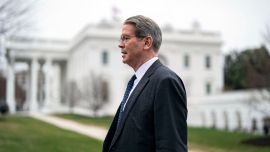President Mauricio Macri called for a deepening of South-South cooperation today, as he opened the Second UN Conference on South-South Cooperation in the capital.
The BAPA+40 conference, as it’s known for short, is taking place on the 40th anniversary of the approval of the Buenos Aires Action Plan (PABA) in 1978, which defined the terms and policies of South-South cooperation. The summit will run until next Friday.
"Cooperation is a great tool to promote the horizontal link between countries with different levels of development," Macri said in his opening speech.
In his own address to delegates, UN Secretary General António Guterres, stressed that technical cooperation among developing countries "showed the value of a different form of cooperation, based on the exchange of knowledge and technologies."
"Cooperation can allow developing countries to learn from each other and grow faster, close the income gap and build more inclusive societies," he said, delivering his speech in English.
Guterres said that "all countries have things to share or teach, no matter what their circumstances."
The UN diplomat also argued that South-South cooperation can contribute to "the transformation of fossil fuel-dependent economies with strategies that reinforce sustainable development and environmental protection."
"If we do it wrong, we will be stuck in a future of greater emissions with potential catastrophic consequences," he warned.
Guterres added, however, that South-South Cooperation could never be a substitute for official development assistance or replace the responsibilities of developed nations, and that it must involve young people, civil society, the private sector, academia and others to build innovative partnerships.
The president of the General Assembly, María Fernanda Espinosa, said BAPA – or PABA + 40, as it's known in Spanish – was a symbol of the determination of the Global South to advance equality for all, across the world:
“The people in New York or New Delhi, in Paris or Pretoria, in Quito or Helsinki, they all share the same dream: a decent job, health and education, a safe and healthy environment, a government that listens and responds, an efficient international system and with tangible results”, she said.
“But these dreams, which seem so elementary, are increasingly distant”, Ms. Espinosa noted. “It is clear that we are helping to restore confidence and the effectiveness of international cooperation and multilateral action. South-South Cooperation represents the best of our people. The principles of solidarity and acting for the common good, make South-South cooperation a powerful force”, she declared.
Regional leaders
Among the world leaders in Buenos Aires for the conference are Chilean President Sebastián Piñera, Uruguayan leader Tabaré Vázquez and Paraguay's Mario Abdo Benítez. The trio met with President Macri at the Olivos presidential residence before the UN conference.
Later this afternoon, Chile confirmed it would be joining Argentina, Paraguay and Uruguay in their regional bid to host the 2030 World Cup.
The head of South American football's governing body CONMEBOL announced the decision Wednesday after the meeting in Olivos.
CONMEBOL President Alejandro Domínguez said on Twitter: "We confirm the agreement between the four countries to keep working on the strategy for FIFA to award us joint organization of the 2030 World Cup."
Argentina and Uruguay, the country that hosted and won the first World Cup in 1930, initially planned to bid for the 2030 tournament together before Paraguay was added later.
Piñera said in February his country would join the group.
- TIMES/AFP

























Comments